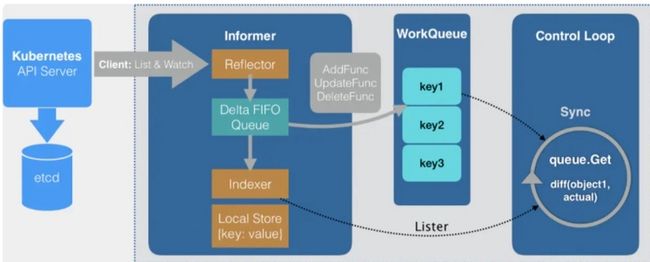主要包括3大组件:
- Informer: 监听资源对象的变化,将变化转成事件放入WorkQueue;
- WorkQueue: 保存变化的事件;
- Control Loop: 消费WorkQueue中的事件,对事件做响应;
其中,Informer较为复杂:
- Reflector: 调用apiservier接口,使用List&Watch对指定类型的资源对象进行监控;
- DeltaFIFO: 增量队列,保存Reflector监控到的change对象;
- LocalStorage: informer的本地cache,用以查询特定类型的资源对象,以减轻apiserver的查询压力;
1. Informer源码
对于要监控的资源类型,每种类型创建一个Informer,比如prometheus CRD:
// 代码入口
// cmd/operator/main.go
func Main() int {
.......
r := prometheus.NewRegistry()
po, err := prometheuscontroller.New(cfg, log.With(logger, "component", "prometheusoperator"), r)
if err != nil {
fmt.Fprint(os.Stderr, "instantiating prometheus controller failed: ", err)
return 1
}
.......
}这里可以看到,用prometheuscontroller.New()创建对应的operator,这也是常说的operator=CRD+Controller:
// pkg/prometheus/operator.go
// New creates a new controller.
func New(conf Config, logger log.Logger, r prometheus.Registerer) (*Operator, error) {
....
c.promInf = cache.NewSharedIndexInformer(
c.metrics.NewInstrumentedListerWatcher(
listwatch.MultiNamespaceListerWatcher(c.logger, c.config.Namespaces.PrometheusAllowList, c.config.Namespaces.DenyList, func(namespace string) cache.ListerWatcher {
return &cache.ListWatch{
ListFunc: func(options metav1.ListOptions) (runtime.Object, error) {
options.LabelSelector = c.config.PromSelector
return mclient.MonitoringV1().Prometheuses(namespace).List(context.TODO(), options)
},
WatchFunc: func(options metav1.ListOptions) (watch.Interface, error) {
options.LabelSelector = c.config.PromSelector
return mclient.MonitoringV1().Prometheuses(namespace).Watch(context.TODO(), options)
},
}
}),
),
&monitoringv1.Prometheus{}, resyncPeriod, cache.Indexers{cache.NamespaceIndex: cache.MetaNamespaceIndexFunc},
)
.....
}创建了prometheus的Informor: c.promInf,可以看到,它监听对象变更使用的是List&Watch;
创建ok后,将该Informer Run起来:
// pkg/prometheus/operator.go
// Run the controller.
func (c *Operator) Run(stopc <-chan struct{}) error {
......
go c.promInf.Run(stopc)
......
}同时为该Informer添加handler,包括Add/Delete/Update:
// pkg/prometheus/operator.go
// Run the controller.
func (c *Operator) Run(stopc <-chan struct{}) error {
......
if err := c.waitForCacheSync(stopc); err != nil {
return err
}
c.addHandlers()
......
}
// addHandlers adds the eventhandlers to the informers.
func (c *Operator) addHandlers() {
c.promInf.AddEventHandler(cache.ResourceEventHandlerFuncs{
AddFunc: c.handlePrometheusAdd,
DeleteFunc: c.handlePrometheusDelete,
UpdateFunc: c.handlePrometheusUpdate,
})
.......
}2. WorkQueue源码
Informer发现监听的对象变更,调用handler,handler会将变更对象放入WorkQueue:
下面是Add Prometheus的事件:
// pkg/prometheus/operator.go
func (c *Operator) handlePrometheusAdd(obj interface{}) {
key, ok := c.keyFunc(obj)
if !ok {
return
}
level.Debug(c.logger).Log("msg", "Prometheus added", "key", key)
c.metrics.TriggerByCounter(monitoringv1.PrometheusesKind, "add").Inc()
checkPrometheusSpecDeprecation(key, obj.(*monitoringv1.Prometheus), c.logger)
c.enqueue(key)
}3. Control Loop源码
operator会启动1个worker,来消费workQueue中的事件:
// pkg/prometheus/operator.go
// Run the controller.
func (c *Operator) Run(stopc <-chan struct{}) error {
.......
go c.worker()
}// pkg/prometheus/operator.go
// worker runs a worker thread that just dequeues items, processes them, and
// marks them done. It enforces that the syncHandler is never invoked
// concurrently with the same key.
func (c *Operator) worker() {
for c.processNextWorkItem() {
}
}看下具体的消费动作:
// pkg/prometheus/operator.go
func (c *Operator) processNextWorkItem() bool {
key, quit := c.queue.Get() //取队列元素
if quit {
return false
}
defer c.queue.Done(key)
err := c.sync(key.(string)) //进行事件操作
if err == nil {
c.queue.Forget(key) //处理完毕,Forget
return true
}
c.metrics.ReconcileErrorsCounter().Inc()
utilruntime.HandleError(errors.Wrap(err, fmt.Sprintf("Sync %q failed", key)))
c.queue.AddRateLimited(key)
return true
}事件处理在c.sync()中,以prometehus statefulset为例:
- 首先检查资源对象是否存在,若不存在则直接创建,返回;
- 否则,更新statefulset对象;
- 若都不满足,则删除statefulset对象;
// pkg/prometheus/operator.go
func (c *Operator) sync(key string) error {
......
ssetClient := c.kclient.AppsV1().StatefulSets(p.Namespace)
// Ensure we have a StatefulSet running Prometheus deployed.
obj, exists, err = c.ssetInf.GetIndexer().GetByKey(prometheusKeyToStatefulSetKey(key))
sset, err := makeStatefulSet(*p, &c.config, ruleConfigMapNames, newSSetInputHash)
//不存在,就创建
if !exists {
level.Debug(c.logger).Log("msg", "no current Prometheus statefulset found")
level.Debug(c.logger).Log("msg", "creating Prometheus statefulset")
if _, err := ssetClient.Create(context.TODO(), sset, metav1.CreateOptions{}); err != nil {
return errors.Wrap(err, "creating statefulset failed")
}
return nil
}
......
//否则,就更新
_, err = ssetClient.Update(context.TODO(), sset, metav1.UpdateOptions{})
// 都不满足,则删除
if ok && sErr.ErrStatus.Code == 422 && sErr.ErrStatus.Reason == metav1.StatusReasonInvalid {
level.Info(c.logger).Log("msg", "resolving illegal update of Prometheus StatefulSet", "details", sErr.ErrStatus.Details)
if err := ssetClient.Delete(context.TODO(), sset.GetName(), metav1.DeleteOptions{PropagationPolicy: &propagationPolicy}); err != nil {
return errors.Wrap(err, "failed to delete StatefulSet to avoid forbidden action")
}
return nil
}
......
}简单看下创建statefulset做的事情,无外乎根据CRD的配置,构造spec对象,然后使用ssetClient.Create创建statefulset:
// pkg/prometheus/statefulset.go
func makeStatefulSet(
p monitoringv1.Prometheus,
config *Config,
ruleConfigMapNames []string,
inputHash string,
) (*appsv1.StatefulSet, error) {
......
spec, err := makeStatefulSetSpec(p, config, ruleConfigMapNames)
......
}func makeStatefulSetSpec(p monitoringv1.Prometheus, c *Config, ruleConfigMapNames []string) (*appsv1.StatefulSetSpec, error) {
......
promArgs := []string{
"-web.console.templates=/etc/prometheus/consoles",
"-web.console.libraries=/etc/prometheus/console_libraries",
}
switch version.Major {
case 1:
......
case 2:
retentionTimeFlag := "-storage.tsdb.retention="
if version.Minor >= 7 {
retentionTimeFlag = "-storage.tsdb.retention.time="
if p.Spec.RetentionSize != "" {
promArgs = append(promArgs,
fmt.Sprintf("-storage.tsdb.retention.size=%s", p.Spec.RetentionSize),
)
}
}
promArgs = append(promArgs,
fmt.Sprintf("-config.file=%s", path.Join(confOutDir, configEnvsubstFilename)),
fmt.Sprintf("-storage.tsdb.path=%s", storageDir),
retentionTimeFlag+p.Spec.Retention,
"-web.enable-lifecycle",
"-storage.tsdb.no-lockfile",
)
......
}